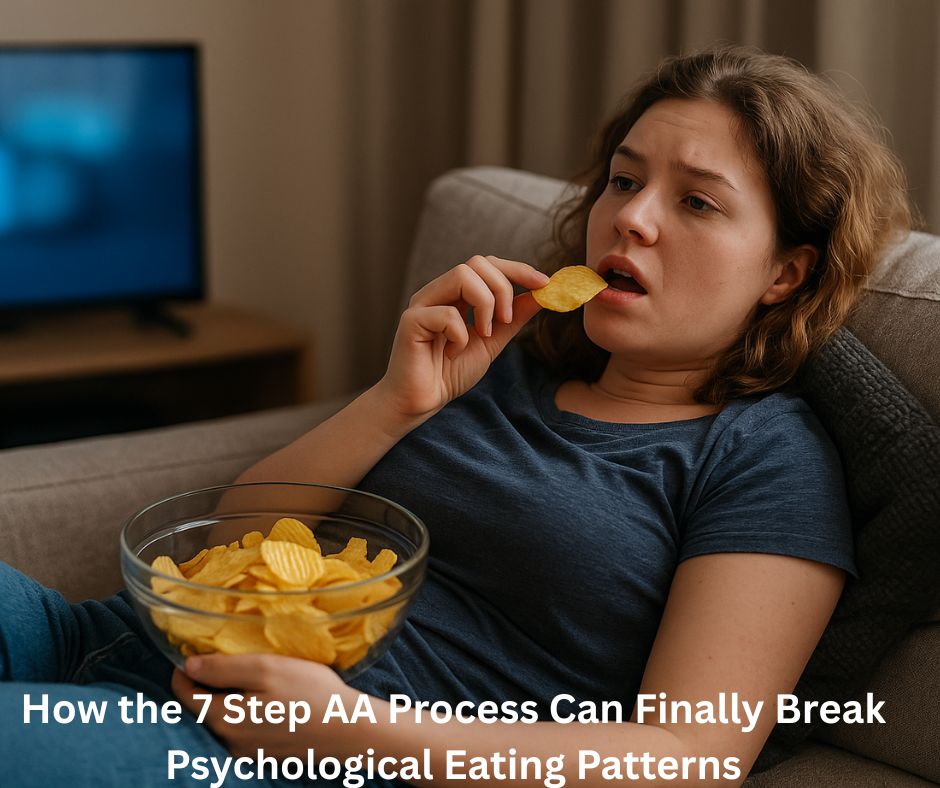How the 7 Step AA Process Can Break Psychological Eating Patterns

In the 7 step AA process people usually don’t think about food struggles, but surprisingly, this recovery based mindset can actually help and break emotional and psychological eating patterns. This is something many people face and deal with on a regular basis.
These eating patterns happen and start to form when someone eats because of how they feel, and not because they’re necessarily hungry.
Stress, sadness, boredom, or even just being overwhelmed can lead people to reach for comfort foods that are usually unhealthy.
Using this process can give people a way to step back, see the pattern, and start to take control of their eating habits.
Why the 7 Step AA Approach Can Work:
The 7 step AA principle is all about being honest with yourself, asking for help, and letting go of behaviors that are holding you back. That’s not just helpful for addiction, but it can also work for eating habits too.
However, even though eating is a necessity, it can also be an addiction.
Eating because of boredom is not just a habit. It’s often tied to deeper, underlying stress or old routines. Sometimes both things are a factor and play a role.
However, admitting that you need a new way of dealing with things is the first step. It’s not about blaming yourself, it’s about deciding that you’re ready to do things differently, and making adjustments.
Don’t want to struggle with your eating habits alone?
Discover how expert coaching can help you regain control and transform your health one small step at a time.
Try Personalized Coaching TodayDisclosure: This post may contain affiliate links, which means I may earn a small commission if you purchase through my links at no additional cost to you. .
Simple Foods That Help with Brain Clarity Can Also Help With Eating Habits:
When your brain feels foggy or tired, it’s easier to reach for quick snacks or junk food. That’s why eating for brain clarity is important. It helps you think more clearly and stay focused, so that you’re not always reacting to stress by turning to food.
Foods that support brain and mental clarity include things like:
- Leafy greens, (like spinach or kale)
- Avocados
- Chia seeds
- Walnuts
- Blueberries
- And the list goes on, but you get the idea.
Eating these kinds of foods regularly can help your brain feel sharper while living a more balanced and healthy lifestyle.
Why Magnesium Meals Help with Stress:
Magnesium meals also help with stress, and are a very beneficial alternative to help with unhealthy eating habits.
Many people don’t get enough magnesium, and that can make stress feel worse. Magnesium meals are an easy way to support your nervous system and reduce stress, which make indulging in eating less likely.
Some good magnesium rich foods include:
- Pumpkin seeds
- Lentils and black beans
- Almonds
- Dark chocolate (yes, really!)
These foods are not just healthy, but they help calm the body and improve your mood. This is exactly what’s needed when you’re trying to stop using food for comfort.
Anti-Inflammatory Diet Meal Plan = Fewer Cravings
Inflammation in the body can affect your mood, and make cravings for unhealthy food worse.
That’s why following an anti-inflammatory diet meal plan can help not just your physical health, but also help with your emotional balance and well being.
An anti-inflammatory diet meal plan focuses on:
- Whole and natural foods
- Healthy fats like olive oil
- Spices like turmeric and ginger
- Colorful fruits and vegetables
You don’t have to be perfect with it. Just substituting a few things out and focusing on these foods can make a real difference in how you feel, and how much you crave snacks or sweets.
For a great and healthy snack, try our Edamame Recipe!
Easy Ways to Control Eating For Comfort:

You don’t have to follow a strict diet to control your eating habits. Instead, try using structure, and build new routines that take pressure off of your decisions.
Try to form new, healthy habits in place of the unhealthy ones.
Here are a few helpful tips:
- Prep meals ahead of time so you’re not reaching for fast food or unhealthy junk when you’re stressed out.
- Keep track of how you feel before and after eating. (A simple journal works great).
- When a craving hits, wait at least five minutes before acting on it. Take a short walk, drink water, or even talk to someone, and try to focus on other things. Being mindful is the key.
The goal is not to be perfect. It’s to give yourself better tools, structures, and routines, so that you don’t feel out of control.
Final Thoughts:
The 7 step AA process isn’t just for addiction. It’s a powerful mindset for anyone who wants to make changes in how they live, eat, and / or handle psychological emotions and patterns.
By using the simple idea of letting go of unhealthy patterns, and combining that with better habits like eating magnesium meals, planning an anti-inflammatory diet meal plan, and focusing on having brain clarity, anyone can start to take real steps towards feeling better, physically, psychologically, and emotionally.
Eating for comfort doesn’t have to control your day. With the right support as well as small changes, it’s possible to eat in a way that supports your mind, your body, and your goals.
Don’t want to struggle with your eating habits alone?
Discover how expert coaching can help you regain control and transform your health one small step at a time.
Try Personalized Coaching Today


